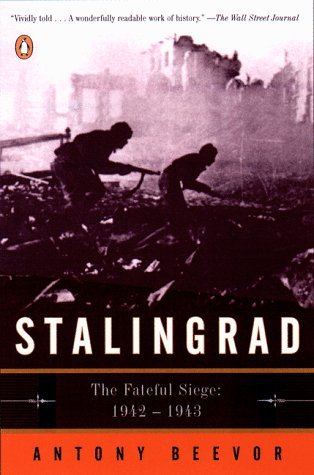More on this book
Community
Kindle Notes & Highlights
most of those incapacitated or permanently scarred, like the artillery colonel whose face had been sliced up by shrapnel, felt that they were no longer proper men.
medical workers, who gave so much of their own blood for transfusion—sometimes twice in an evening—that they frequently collapsed. ’If they don’t give blood‘, a report explained, ’soldiers will die‘.
‘You can’t imagine how they’re defending Stalingrad—like dogs.’
‘For the defenders of Stalingrad there is no ground on the other side of the Volga.’
Mikhail Panikako seized two petrol bombs. As he was poised to throw the first one, a lucky German bullet shattered it in his hand, covering him in flames. He hurled himself forward over the last few yards, and flung himself against the side of the tank, smashing the other one in a ball of fire on the engine decks behind the turret.
total figure of 13,500 executions, both summary and judicial, during the battle of Stalingrad.
One pilot, who baled out of his burning plane, tore up his Communist Party candidate’s card immediately after landing, because he thought he had come down behind German lines.
‘When soldiers mutter, officers should not listen.’ Most recognized that in war, when men faced death, they needed to say what they thought.
To be honest about it - in the trenches the last thing we thought about was Stalin.
It was a well-known occurrence for a soldier, too badly wounded to remove his snow-camouflage suit, to apologize for any marks to those taking it from him.
Many were used as runners, scouts or spies, but the smaller orphans, some as young as four or five, were just mascots.
bulbovitsi, extreme right-wing nationalists named after Taras Bulba,
The climate and environment in Italy makes an Italian soldier different from a German soldier. Italians tire more easily on one hand, and on the other they are more exuberant.
Hitler loathed the idea of Untermensch Slavs in German uniforms, so they had to be redefined as Cossacks, who were considered racially acceptable.
the Sixth Army would not be allowed to break off this battle, whatever the consequences. ‘It has even become a matter of prestige between Hitler and Stalin.’
‘house-warmings’,
‘dogged, rugged, Siberian obstinacy’.
‘I cannot understand’, one wrote home, ‘how men can survive such a hell, yet the Russians sit tight in the ruins,
He gave orders that signs should be put up in German cities showing the distance to Stalingrad. Three days later he ordered that names such as Red October and Red Barricade should be avoided at all costs when reporting the tough fighting, in case it encouraged ‘Communist-infected circles’.
But I can’t distinguish where you end, and where the Motherland begins. You and it are the same for me.’
When one of them received an award, his comrades dropped it in a mug of vodka, which he then had to drink, catching the medal in his teeth as he drained the last drops.
The highest scorer, identified only as ‘Zikan’, killed 224 Germans by 20 November.
sniper cult
‘the dogs fight like lions’.
We often think that Russia should capitulate, but these uneducated people are too stupid to realize it.’
The Sixth Army, especially the vast majority of its artillery and medical units, depended almost entirely on horses for their mobility.
Jokes about ‘the little partisans’ soon wore off.
the great German offensive had petered out at the very end of October through exhaustion and a lack of ammunition.
Red Army soldiers started to improvise hooks on their grenades to catch on to the netting.
In addition, the days are constantly getting shorter, and the weather’s getting worse.’
Operation Uranus,
But this time his desire for revenge helped control his impetuousness.
Stalin’s great advantage over Hitler was his lack of ideological shame.
The very suggestion that the Soviet Union, deprived of major industrial regions, could outproduce the Reich, filled Hitler with angry disbelief. Nazi leaders had always refused to acknowledge the strength of Russian patriotic feeling. They also underestimated the ruthless programme of evacuation of industry to the Urals and the militarization of the workforce.
collective sacrifice—both forced and willing at the same time—represented
Soviet production depended on the mass mobilization of mothers and daughters.
Chelyabinsk, the great centre of war industries in the Urals, became known as Tankograd.
For the death of enemies For the joy of friends There is no better machine Than the T-34!
millions of tons of wheat in white sacks stamped with the American eagle and cans of Spam or corned beef from Chicago,
‘greatest feat was in masking the scale of the offensive’.
‘door-knocker’ because its shells could not penetrate the armour of the T-34.
mice had sought shelter from the weather inside the hulls. They had gnawed through the insulation of electric cables and no replacements were immediately available.
Because there were so few landmarks in this snowbound waste, local civilians had been attached as guides to the point units, but this was not enough. The visibility was so bad that the commanders had to steer by compass.
For those who took part, it was the ‘happiest day of the whole war’, including even the final German surrender in Berlin.
It was the first time that the Russians used tanks as we did.’
It was the point from which German panzers had gazed down upon the town on 2 August.
The celebratory exchanges of vodka and sausage between tank crews at the time were unfilmed, but far more genuine.
’we were put instead of horses to drag the carts loaded with ammunition and food. Those prisoners who could not drag the carts as quickly as the Feldwebel wanted were shot on the spot.
A priority was given to walking wounded. They could be sent back into the battle.
but it was not so much the frozen earth as the frozen water which affected the retreat.


